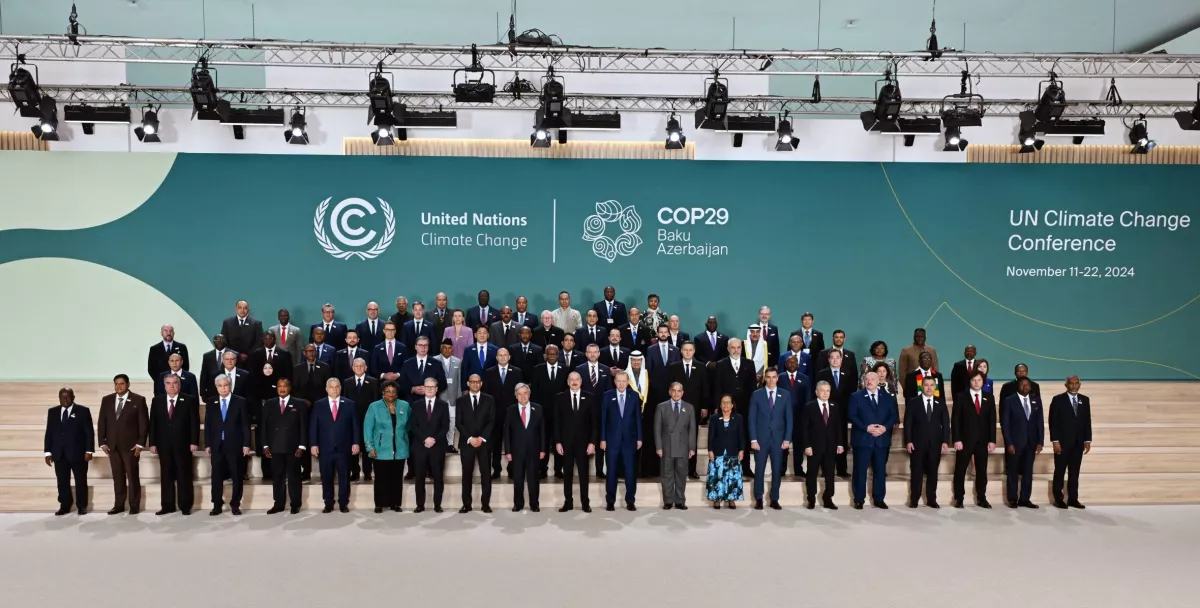COP29: The first three days, early successes Baku demonstrates a serious approach
During the first three days of the COP29 conference held in Baku under the UN Framework Convention on Climate Change, participants discussed key issues of the global "green" agenda, outlined several tangible steps to achieve the UN’s goals, and actively demonstrated their commitment to climate obligations outlined in the Paris Agreement to limit global temperature rise. Let’s take a look at what has been accomplished during this relatively short but eventful period of COP29.
Day one: Shaping the agenda
One of the main events on the first day of the climate forum was the approval of the conference agenda, which served as the first test for the leadership of COP29, and it was successfully passed, ensuring consensus among the participants. Achieving this compromise required active diplomacy and intensive negotiations involving a significant number of parties, and the very fact that the agenda was agreed upon demonstrates the determination of conference participants to achieve tangible changes in global climate policy.
At the same time, consensus was reached on the standards for transparent and reliable carbon markets, as outlined in Article 6.4 of the 2015 Paris Agreement. This is a significant achievement, as carbon markets are a crucial tool for redistributing resources in favor of developing countries. In general, Article 6 aims to reduce the costs of implementing national climate plans by $250 billion annually, creating conditions for cooperation and the exchange of CO2 emission quotas. This is especially valuable for resource-limited countries striving to cut emissions.
Day two: Leaders and financing climate initiatives
On the second day of the conference, the COP29 Leaders' Summit was opened, with 80 heads of state and vice presidents delivering statements, reaffirming their countries' commitment to the Paris Agreement. The large-scale participation—around 70,000 registered attendees—highlights the growing global interest in addressing climate issues.

In turn, multilateral development banks (MDBs) announced their intention to increase funding for climate initiatives to $170 billion per year by 2030, with $120 billion planned for low- and middle-income countries. This is a strong signal to developing nations, which require investment to transition to clean technologies and adapt to climate change.
Another significant step at the Leaders' Summit was the progress toward the establishment of the Loss and Damage Fund, which is expected to begin distributing funds by 2025. An agreement was signed with the Philippines, granting the country the status of a host nation for the fund, and arrangements were made with the World Bank (WB) regarding fund management. These measures will help expedite the process of providing assistance to countries affected by climate change, supporting their adaptation and ecological recovery.
Among the key events on the second day of the conference was the summit on methane emission reductions. During this event, countries such as the US, China, the EU, the UAE, the UK, Brazil, Canada, Nigeria, and Azerbaijan presented their national plans and strategies to reduce methane emissions from organic waste. Reducing methane emissions, which has a stronger greenhouse effect than carbon dioxide, is one of the fastest ways to slow global warming.
Day three: Supporting Small Island Developing States
On the third day of COP29, participants were presented with the first draft of the decisions text on the New Quantitative Climate Goal (NCQG). Special attention was given to Small Island Developing States (SIDS), which are in urgent need of climate financing. A summit held for this purpose allowed leaders from these countries to voice their priorities, which is particularly important as they are among the most affected by the negative impacts of climate change, primarily due to rising sea levels.
Another significant event was the creation of the COP Presidencies Coalition for Continuity in Climate and Health. The goal of this structure is to strengthen the role of healthcare in the climate agenda. The participation of the Director-General of the UN’s World Health Organization (WHO) and the presidents of COP28—COP30 underscores the importance of this issue, especially in light of potential health crises linked to climate challenges.
Biennial Transparency Reports (BTRs): Throughout this year, efforts were made to highlight the importance of transparency and the preparation of BTRs. Azerbaijan, along with countries such as Andorra, Spain, Guyana, Japan, Panama, Kazakhstan, Türkiye, the Netherlands, and Singapore, is ready to submit its reports, underscoring the international community's commitment to ensuring openness in fulfilling climate obligations.
Azerbaijan intensifies participation in climate dialogue
Azerbaijan is also actively engaging in the climate dialogue, preparing to present its first Biennial Transparency Report (BTR), which will demonstrate the country's progress in meeting its national climate commitments. This step confirms Azerbaijan's serious approach to addressing climate change and its commitment to transparency in its climate agenda.








